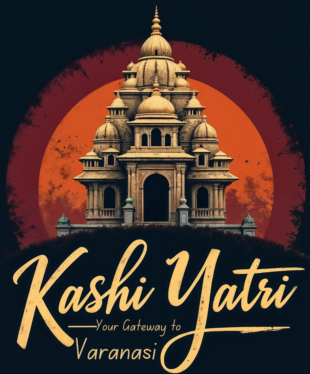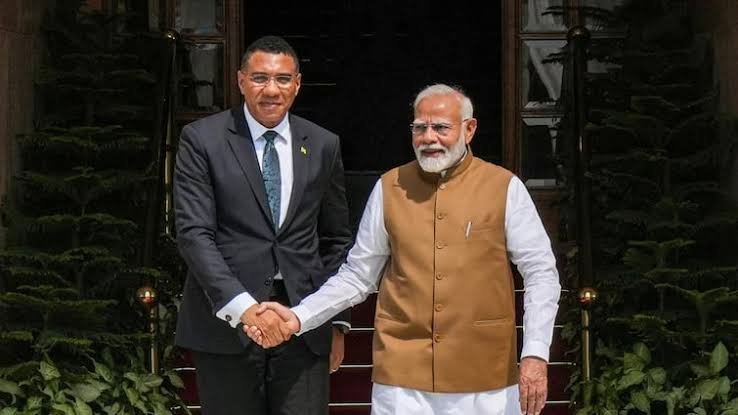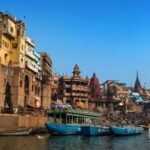In the beginning
A great number of devotees attach a great deal of spiritual importance to the city of Varanasi, which is one of the oldest cities in the world that has been continually inhabited. Varanasi, which is located on the banks of the holy Ganges River, has long been regarded as a place that provides spiritual enlightenment. The Ganga Aarti, which is a daily ritual that pays reverence to the holy river, is considered to be one of the most revered traditions in the city.
The ritual, which is renowned for its grandeur and devotion, attracts guests from all over the world, including politicians and famous figures. Andrew Holness, the Prime Minister of Jamaica, recently traveled to Varanasi, where he was able to witness the magnificent Ganga Aarti that took place at Dashashwamedh Ghat. His visit, which was marked by profound moments of reverence, brought a one-of-a-kind worldwide dimension to an occasion of great significance.
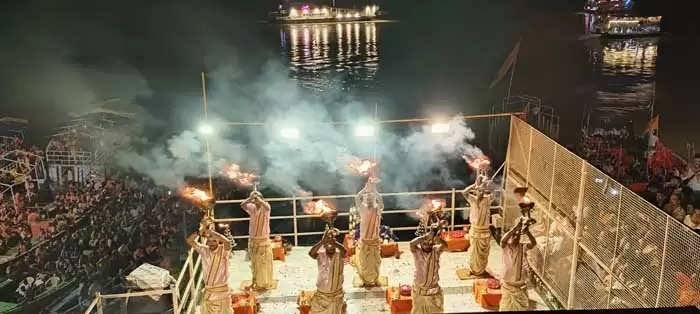
The Arrival of Jamaican Prime Minister Andrew Holness in Varanasi
As part of his diplomatic visit to India, Prime Minister Andrew Holness special journey to Varanasi, the cultural and spiritual capital of the country. His voyage began at Namo Ghat, a recently created riverfront attraction in Varanasi, from whence he embarked on a tranquil sail along the Ganges River to Dashashwamedh Ghat, the core of the Ganga Aarti.
The choice of Varanasi as a stop on his tour shows the growing relevance of India’s spiritual and cultural legacy on the global stage. With its rich history, old temples, and ageless customs, Varanasi offers an insight into the deep spiritual ethos that defines much of India’s identity. For Prime Minister Holness, the visit was not only a ceremonial stop but an opportunity to connect with the city’s great spiritual tradition.
The Significance of the Ganga Aarti
The Ganga Aarti is a symbolic ceremony that indicates the offering of devotion to the powerful River Ganges, which Hindus consider to be a manifestation of the goddess Ganga. The event, performed every evening at Dashashwamedh Ghat, features a group of Brahmin priests dressed in traditional garb, chanting mantras, and giving sacrifices to the river with lights, incense, and flowers. The entire process is set against the backdrop of the Ganges, with hundreds of devotees and tourists gathered on the ghats to see this amazing performance.
For ages, the Ganga Aarti has served as a method for people to show their thanks to the river, which nourishes life and is considered to offer salvation. The aarti’s significance is not simply religious but also cultural, since it brings individuals from all origins together in a shared sense of devotion and reverence. The event epitomizes the essence of Varanasi, where the material and spiritual worlds effortlessly blend.
The Experience of Andrew Holness at the Ganga Aarti
As Prime Minister Holness landed at Dashashwamedh Ghat aboard a cruise boat, he was greeted by a display of traditional Indian hospitality. The colorful ambiance of the ghat, replete with the sound of ringing bells and pious chants, quickly attracted his attention. He was seen folding his hands in a show of reverence and humility, embracing the spiritual essence of the occasion.
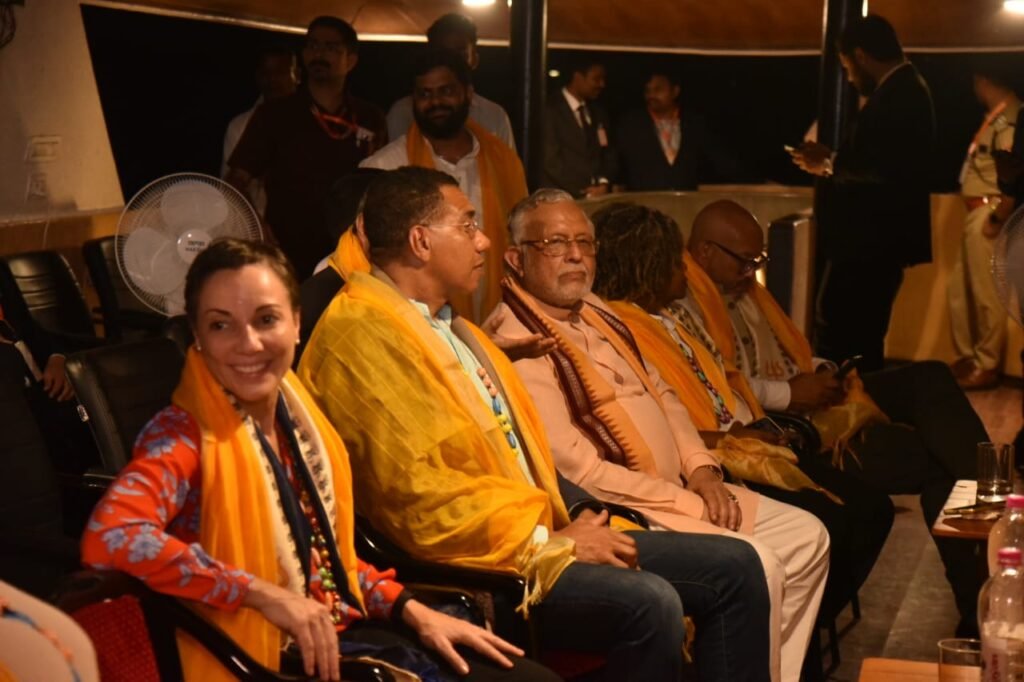
During the 30-minute event, Prime Minister Holness stood in reverence, occasionally closing his eyes in meditation and prayer. The sight of the synchronized motions of the priests, their dazzling torches illuminating the night sky, and the chanting booming through the air produced an otherworldly mood. The Prime Minister’s emotions were obvious, as he was sincerely moved by the passion and enthusiasm of the service.
In many ways, Prime Minister Holness’s reaction matched the response of many others who have observed the Ganga Aarti over the ages. The mix of sound, light, and dedication provides a spiritual experience that transcends cultural and national barriers. It is a time of connection, not simply to the divine but also to the shared humanity of all there.
Security and Arrangements at Dashashwamedh Ghat
Given the high-profile nature of the visit, substantial security measures were in place at Dashashwamedh Ghat. A strong detachment of police personnel was stationed throughout the area to protect the safety of the dignitary as well as the general public. Despite the heightened security, the essence of the aarti remained unchanged, as the spiritual milieu of the ceremony continued to attract everyone there.
Special arrangements were also made to facilitate the Prime Minister’s presence without disrupting the flow of the ceremony. The priests did the aarti with their usual dedication, cognizant of the significance of the occasion. The space where the ritual took place was slightly narrower due to recent flooding, yet the eight priests who performed the aarti did it with grace and precision.
The Cultural Diplomacy of the Visit
Prime Minister Andrew Holness’s visit to Varanasi and his participation in the Ganga Aarti show the increasing importance of cultural diplomacy in today’s globalized world. While diplomatic ties are frequently based around economic, political, and geopolitical factors, cultural exchanges like this one give an opportunity to promote deeper understanding and mutual respect between nations.
India’s rich cultural legacy, particularly its spiritual traditions, has long been a source of attraction for people around the world. By interacting with these traditions, leaders like Prime Minister Holness serve to develop bridges between their own countries and India, promoting a feeling of global solidarity and common values. The Jamaican Prime Minister’s genuine interest in and respect for the Ganga Aarti highlight the capacity of such experiences to transcend geographical barriers and establish ties based on shared spiritual values.
Varanasi: A City of Spiritual Unity
The significance of Varanasi stretches beyond religious boundaries. While it is largely renowned as a hub for Hindu spirituality, the city has a long history of supporting religious tolerance and unity. It is home to a broad array of religious sects, including Hindus, Muslims, Buddhists, and Jains, all of whom have made their stamp on the city’s cultural environment. This ethos of inclusivity is represented in the Ganga Aarti itself, which attracts people from all walks of life, irrespective of their creed or nationality.
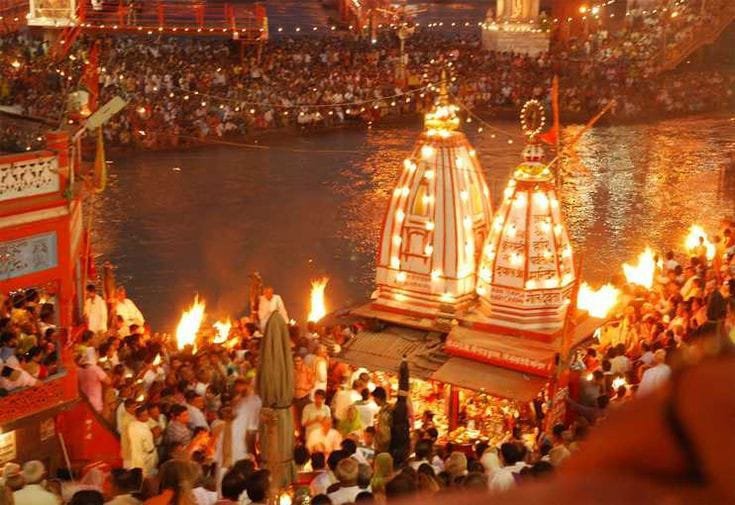
For Prime Minister Holness, watching the Ganga Aarti in Varanasi may have been a reminder of the global nature of spiritual experiences. The attention paid to the Ganges, the symbolism of light and water, and the collective commitment of those there all point to a greater truth: that spiritual traditions, no matter where they originate, have the potential to draw people together in a shared feeling of wonder and thankfulness.
The Impact of the Ganga Aarti on International Visitors
Varanasi has long been a destination for spiritual seekers from around the world. The Ganga Aarti, in particular, has a tremendous impact on overseas tourists, many of whom describe the experience as transforming. The combination of the ancient ritual, the natural grandeur of the Ganges, and the strong sense of devotion creates a compelling environment that connects powerfully with individuals from all countries.
For leaders like Prime Minister Holness, seeing such a profound spiritual experience can offer significant insights into the values and traditions that create the societies they work with. The experience of the Ganga Aarti may well inspire greater appreciation for India’s spiritual legacy and develop a deeper awareness of the significance that rituals and traditions play in the lives of people around the world.
Conclusion: A Memorable Spiritual Experience for Prime Minister Holness
Prime Minister Andrew Holness’s visit to Varanasi and his participation in the Ganga Aarti at Dashashwamedh Ghat will definitely be remembered as a major occasion in his diplomatic journey to India. His real emotional response to the rite, highlighted by moments of introspection and reverence, illustrates the global attraction of spiritual activities like the Ganga Aarti.
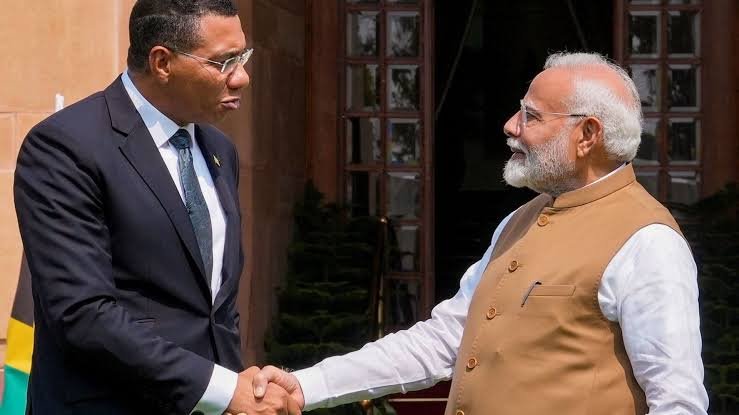
As Varanasi continues to welcome visitors from throughout the globe, the city’s unique blend of history, spirituality, and culture will continue to draw those seeking to connect with something higher than themselves. For Prime Minister Holness, the experience of watching the Ganga Aarti may serve as a reminder of the power of common spiritual traditions to unify people in a world that often feels divided.
In a time where diplomacy is often dominated by discussions of economics, security, and politics, it is refreshing to see a leader like Prime Minister Holness embrace the spiritual and cultural dimensions of international relations. His journey to Varanasi serves as a monument to the lasting value of cultural diplomacy and the role that spiritual experiences can play in developing understanding and cooperation between nations.
As Varanasi looks toward the future, its spiritual traditions, highlighted by the Ganga Aarti, will remain a source of inspiration for people from all walks of life, reminding us all of the ageless force of dedication, unity, and shared humanity.
